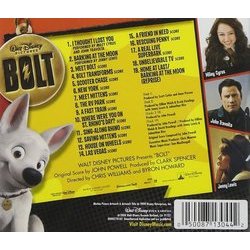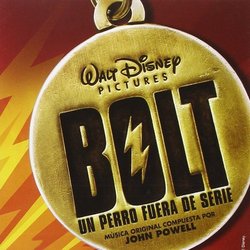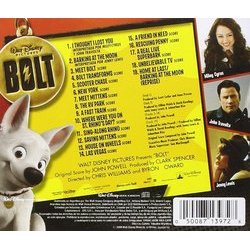Bolt
Subscribe now!
Stay better informed and get access to collectors info!
Stay better informed and get access to collectors info!
| # | Track | Artist/Composer | Duration |
|---|---|---|---|
| 1. | I Thought I Lost You | Miley Cyrus and John Travolta | 3:36 |
| 2. | Barking at the Moon | Jenny Lewis | 3:17 |
| 3. | Meet Bolt | 1:49 | |
| 4. | Bolt Transforms | 1:00 | |
| 5. | Scooter Chase | 2:29 | |
| 6. | New York | 1:44 | |
| 7. | Meet Mittens | 1:25 | |
| 8. | The RV Park | 2:14 | |
| 9. | A Fast Train | 2:38 | |
| 10. | Where Were You on St. Rhino's Day? | 1:58 | |
| 11. | Sing-Along Rhino | 0:42 | |
| 12. | Saving Mittens | 1:02 | |
| 13. | House on Wheels | 3:07 | |
| 14. | Las Vegas | 2:01 | |
| 15. | A Friend in Need | 1:13 | |
| 16. | Rescuing Penny | 3:09 | |
| 17. | A Real Live Superbark | 0:46 | |
| 18. | Unbelievable TV | 1:20 | |
| 19. | Home at Last/Barking at the Moon (Reprise) | Jenny Lewis | 1:29 |
| 36:58 |
Submit your review
Show reviews in other languages
The year 2008 seemed like a never-ending journey for John Powell. Having had to score five other movies (Jumper, Stop Loss, Horton Hears a Who, Hancock, and Kung Fu Panda ) Bolt was his last scoring assignment, and probably his best. Bolt, which was recently nominated for an Oscar in the Best Animated Feature Film of the Year category, is a lovely Disney film telling the story of a dog who thinks he has superpowers, when in reality, he has none outside his TV show. The main story focuses on Bolt’s journey from New York to Hollywood after getting lost. While in this journey, Bolt meets interesting characters that allow him to understand and distinguish between his superhero and normal ‘dog’ personas. Needless to say, Bolt is an outstanding achievement in terms of animation, voiceover work, and music. For the latter, Powell is able to create a thematically driven score that relies on its orchestrations to conform to the geographic shifts of the movie. And while the Penny and Bolt theme becomes the primary musical connection for the two characters, there are many other motifs and arrangements that follow Bolt along his journey from New York to Hollywood, and more importantly, his journey from a superhero to an ordinary dog.
‘Meet Bolt’ begins as they show the little playful Bolt waiting for someone to pick him up from the display at the pet store. The theme heard here will be heard countless other times throughout the score, especially when referencing Penny and Bolt, as Penny is the little girl who picks him up and shows her affection for him before he becomes a successful TV icon. The simple theme is incredibly effective, providing tremendous functionality for an emotionally contained movie. The piano performance of the theme seems to foreshadow one of the final sequences in the movie in which Penny apparently appears happy with another dog that resembles Bolt.
Later on, the five-note motif introduced in ‘Bolt Transforms’ establishes the superhero aspect of Bolt. The theme is simple enough to convey the strength of the super dog but is never too heroic or over the top. This theme will also be used in other parts of the score whenever Bolt’s courageous acts are shown, and will keep the superhero side of Bolt differentiated from his normal, loving side looking to find his true owner and friend, Penny. Powell’s mix of orchestral elements with synthesized sounds works well, as usual, always energizing viewers but never becoming too intrusive. ‘Scooter Chase’ expands the Bolt superhero theme and introduces a few other musical ideas reminiscent of the work Powell and Harry Gregson-Williams did for “Antz.” Again, the music is powerful enough to follow Penny and Bolt in this TV episode, placing them against the infamous green-eyed man, but never taking away anything from the brilliant animations and direction.
Both tracks, ‘New York’ and ‘Meet Mittens,’ showcase a more stylized and ethnic background score. New York contains music very suggestive of Fenton’s score for You’ve Got Mail, while ‘Meet Mittens’ — with the unavoidable mandolins — simply makes reference to The Godfather and Nino Rota's old Italian scores. (The whole concept of the pigeons and Mittens hints at the Italian mafia — in a fun, good way, of course).
Once again we start noticing the unmistakable sound of John Powell in ‘A Fast Train’ and “Where Were You on St. Rhino’s Day.’ His orchestrations are never stale, always allowing woodwinds, brass, and strings to shine individually while keeping the adrenaline flowing. There are no new themes, but Powell does a great job of creating rich and intricate string lines incorporating some of the other themes and motifs. Alas, like most of the other tracks in this album, these pieces are extremely short.
As Bolt, Mittens, and Rhino travel in a beautiful mobile home wondering whether they will ever find a place with a loving family, Mittens shows Bolt the true behavior of dogs. Meanwhile, ‘House on Wheels’ serves as the background score for this scene; not surprisingly, Powell’s versatility as a composer really flourishes, as the arrangements are incredibly intricate. Not only does he incorporate a wonderful new theme, but more importantly, he also builds this track around the first Penny theme, always evoking the sound of the beautiful friendship these two characters had before Bolt got lost.
‘A Friend in Need,’ ‘Rescuing Penny,’ ‘A Real Live Superbark,’ and ‘Unbelievable TV’ would probably be considered one splendid expansion of the Penny and Bolt’s theme. The emotional undertone from the first three aforementioned tracks can be described as the musical pinnacle of this album. ‘Unbelievable TV,’ which accompanies the second half of the end credits and contains some variations of the Bolt superhero theme, is also built upon very solid compositions.
While the songs in the soundtrack are nothing spectacular, they are quite enjoyable, especially considering their effectiveness in the movie. Not being a Miley Cyrus fan myself, I found her songs to simply serve as an extension of Penny, which as a duet with John Travolta (Bolt) in ‘I Thought I lost You’ reinforces the wonderful friendship these two characters have. Without a doubt, both the score and the movie were among the best to come out of Hollywood in 2008. Powell’s incredible year as a film composer could not have been complete without this great score. Bolt was probably his best score of the year — and let’s not forget that he also had to score five other movies. This is what a Disney score should be all about: great energy, beautiful and emotional themes, and a wonderful tool serving as reminder of the movie’s message and meaning. The songs can be a negative for some Powell fans, but focusing solely on the score, we can call this a truly impressive achievement for Powell. Bolt is one score film music fans will enjoy for many years.
‘Meet Bolt’ begins as they show the little playful Bolt waiting for someone to pick him up from the display at the pet store. The theme heard here will be heard countless other times throughout the score, especially when referencing Penny and Bolt, as Penny is the little girl who picks him up and shows her affection for him before he becomes a successful TV icon. The simple theme is incredibly effective, providing tremendous functionality for an emotionally contained movie. The piano performance of the theme seems to foreshadow one of the final sequences in the movie in which Penny apparently appears happy with another dog that resembles Bolt.
Later on, the five-note motif introduced in ‘Bolt Transforms’ establishes the superhero aspect of Bolt. The theme is simple enough to convey the strength of the super dog but is never too heroic or over the top. This theme will also be used in other parts of the score whenever Bolt’s courageous acts are shown, and will keep the superhero side of Bolt differentiated from his normal, loving side looking to find his true owner and friend, Penny. Powell’s mix of orchestral elements with synthesized sounds works well, as usual, always energizing viewers but never becoming too intrusive. ‘Scooter Chase’ expands the Bolt superhero theme and introduces a few other musical ideas reminiscent of the work Powell and Harry Gregson-Williams did for “Antz.” Again, the music is powerful enough to follow Penny and Bolt in this TV episode, placing them against the infamous green-eyed man, but never taking away anything from the brilliant animations and direction.
Both tracks, ‘New York’ and ‘Meet Mittens,’ showcase a more stylized and ethnic background score. New York contains music very suggestive of Fenton’s score for You’ve Got Mail, while ‘Meet Mittens’ — with the unavoidable mandolins — simply makes reference to The Godfather and Nino Rota's old Italian scores. (The whole concept of the pigeons and Mittens hints at the Italian mafia — in a fun, good way, of course).
Once again we start noticing the unmistakable sound of John Powell in ‘A Fast Train’ and “Where Were You on St. Rhino’s Day.’ His orchestrations are never stale, always allowing woodwinds, brass, and strings to shine individually while keeping the adrenaline flowing. There are no new themes, but Powell does a great job of creating rich and intricate string lines incorporating some of the other themes and motifs. Alas, like most of the other tracks in this album, these pieces are extremely short.
As Bolt, Mittens, and Rhino travel in a beautiful mobile home wondering whether they will ever find a place with a loving family, Mittens shows Bolt the true behavior of dogs. Meanwhile, ‘House on Wheels’ serves as the background score for this scene; not surprisingly, Powell’s versatility as a composer really flourishes, as the arrangements are incredibly intricate. Not only does he incorporate a wonderful new theme, but more importantly, he also builds this track around the first Penny theme, always evoking the sound of the beautiful friendship these two characters had before Bolt got lost.
‘A Friend in Need,’ ‘Rescuing Penny,’ ‘A Real Live Superbark,’ and ‘Unbelievable TV’ would probably be considered one splendid expansion of the Penny and Bolt’s theme. The emotional undertone from the first three aforementioned tracks can be described as the musical pinnacle of this album. ‘Unbelievable TV,’ which accompanies the second half of the end credits and contains some variations of the Bolt superhero theme, is also built upon very solid compositions.
While the songs in the soundtrack are nothing spectacular, they are quite enjoyable, especially considering their effectiveness in the movie. Not being a Miley Cyrus fan myself, I found her songs to simply serve as an extension of Penny, which as a duet with John Travolta (Bolt) in ‘I Thought I lost You’ reinforces the wonderful friendship these two characters have. Without a doubt, both the score and the movie were among the best to come out of Hollywood in 2008. Powell’s incredible year as a film composer could not have been complete without this great score. Bolt was probably his best score of the year — and let’s not forget that he also had to score five other movies. This is what a Disney score should be all about: great energy, beautiful and emotional themes, and a wonderful tool serving as reminder of the movie’s message and meaning. The songs can be a negative for some Powell fans, but focusing solely on the score, we can call this a truly impressive achievement for Powell. Bolt is one score film music fans will enjoy for many years.
Golden Globes: Best Original Song: "I Thought I Lost You" (Nominee)
Trailer:
Trailer:
Trailer:
Soundtracks from the collection: Kids

















